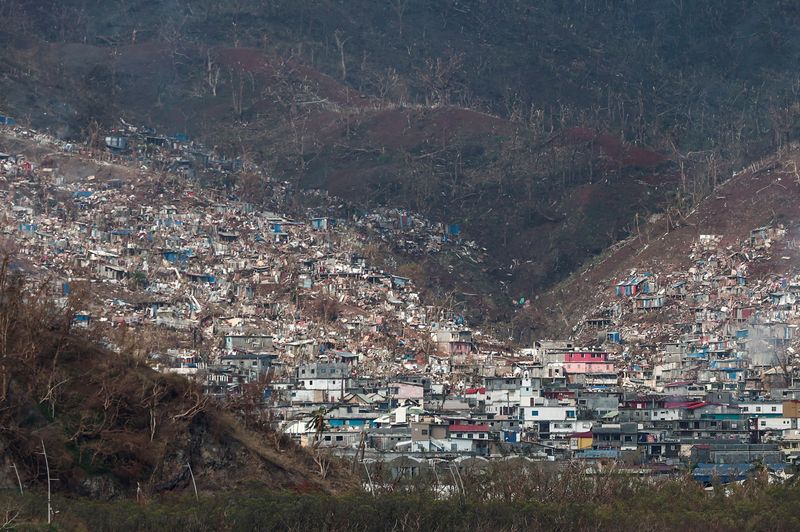By Tassilo Hummel
PAMANDZI, Mayotte (Reuters) -Authorities in Mayotte struggled on Tuesday to stop hunger, disease and lawlessness from spreading in the French overseas territory after the weekend's devastating cyclone, while Mozambique reported dozens of deaths from the storm.
Hundreds or even thousands could be dead in Mayotte, which took the strongest hit from Cyclone Chido, French officials have said. The storm laid waste to large parts of the Indian Ocean archipelago, France's poorest overseas territory, before striking the African mainland.
Essential goods, medical and technical staff and police were arriving via the air bridge with La Reunion, the territory's only lifeline.
With many parts of Mayotte still inaccessible and some victims buried before their deaths could be officially counted, it may take days to discover the full extent of the destruction.
So far, 22 deaths and 1,373 injuries have been confirmed in Mayotte, the interior ministry said, adding there were currently no reports of disease outbreaks.
"It's impossible to find them all", said Mathieu Gouzou, a sports teacher at the Bouéni M'titi-Labattoir middle school in the town of Dzaouzi when asked about the fate of his pupils. "Many of them live in the shantytown nearby, nobody can go there."
French President Emmanuel Macron will visit Mayotte on Thursday, his office said. Opposition politicians in France have criticised what they say is the government's neglect of Mayotte and failure to prepare for natural disasters linked to climate change.
Ambdilwahedou Soumaila, the mayor of the capital Mamoudzou, described a grim scene as authorities prioritised the distribution of food and water.
"There are people who have unfortunately died where the bodies are starting to decompose that can create a sanitary problem," he told Radio France Internationale. "We don't have electricity. When night falls, there are people who take advantage of that situation."
The International Federation of the Red Cross and Red Crescent Societies said the number of victims was likely to be much higher as about a third of the island's population was still unaccounted for because of bad communications.
"It's a small island with 300,000 inhabitants, and because the cyclone has disturbed the electricity, the connection of the internet and the phone lines, about 100,000 people are still unaccounted for," IFRC communications manager Nora Peter said.
Tens of thousands of people may have died in Mayotte, and doctors are bracing for a surge in disease, a dental surgeon at the islands' only hospital said on Tuesday.
"The fact that we don't see that many injured from the cyclone when everything has collapsed makes us think that all these people are still buried and are dead," Naouelle Bouabbas told Reuters in a video call from the islands.
SHANTYTOWNS
Rescue workers have been searching for survivors amid the debris of shantytowns bowled over by 200 kph (124 mph) winds.
"My children are traumatised, my husband hasn't slept in three nights," said Anne, a doctor and mother of four who came back to Mayotte in the afternoon. "I needed to go to La Reunion for a professional training, and then I was trapped there."
The situation is made more difficult by the fact that the exact size of Mayotte's population, which rose by an estimated 100,000 over the last 10 years mainly due to undocumented immigration, is unknown.
France's interior ministry announced that a curfew would go into effect on Tuesday night from 10 p.m. to 4 a.m. local time.
Doctor Claudia Lodesani of Doctors without Borders said it was crucial to restore access to drinking water to avert the outbreak of cholera and other diseases.
"An epidemic is not inevitable, but there is a very high risk," she told Reuters, saying that even before the storm access to clear water and health services was difficult in shantytowns, where many immigrants live.
"France will repair the hospital quickly, but the situation in the shantytowns is worrying," Lodesani said.
Chido was the strongest storm to strike Mayotte in more than 90 years.

In Mozambique, it has killed at least 34 people, officials said on Tuesday. Another seven died in Malawi.
Drone footage from Mozambique's Cabo Delgado province showed razed thatched-roof houses near the coast and personal belongings scattered under the few palm trees still standing.
